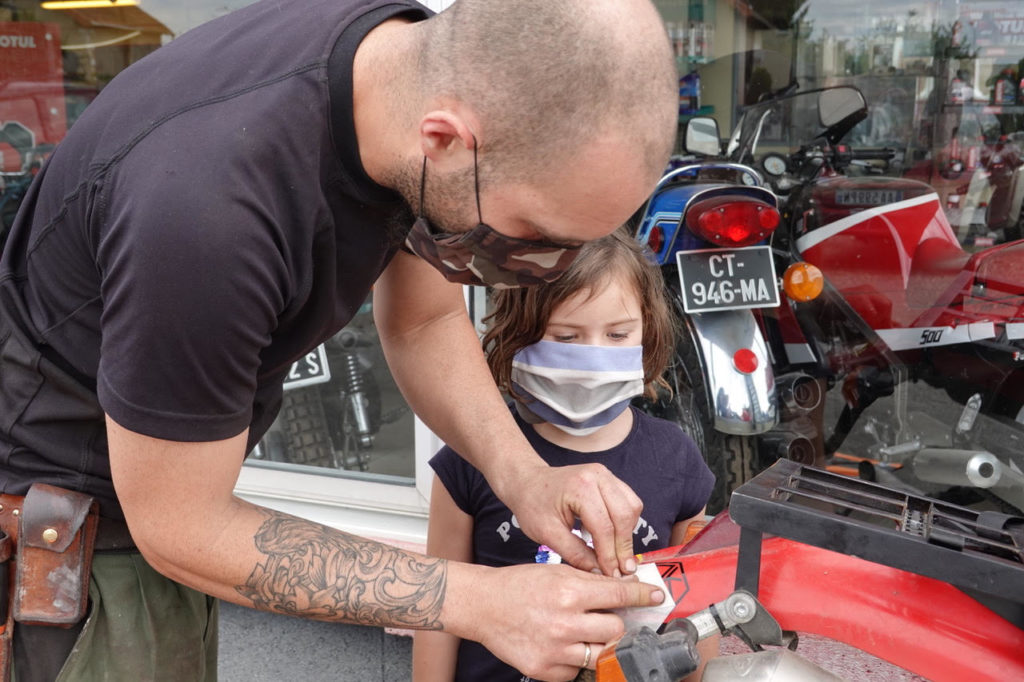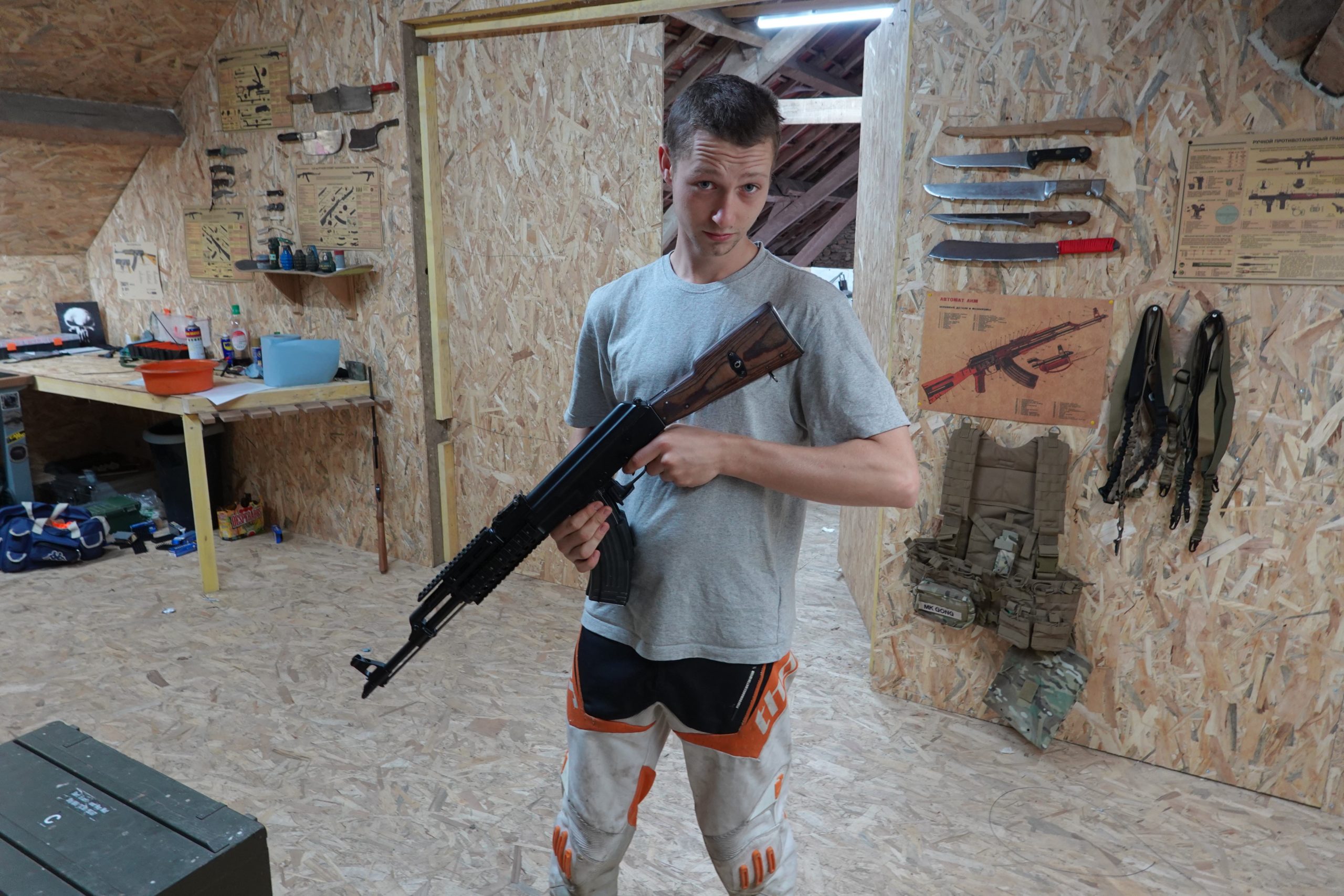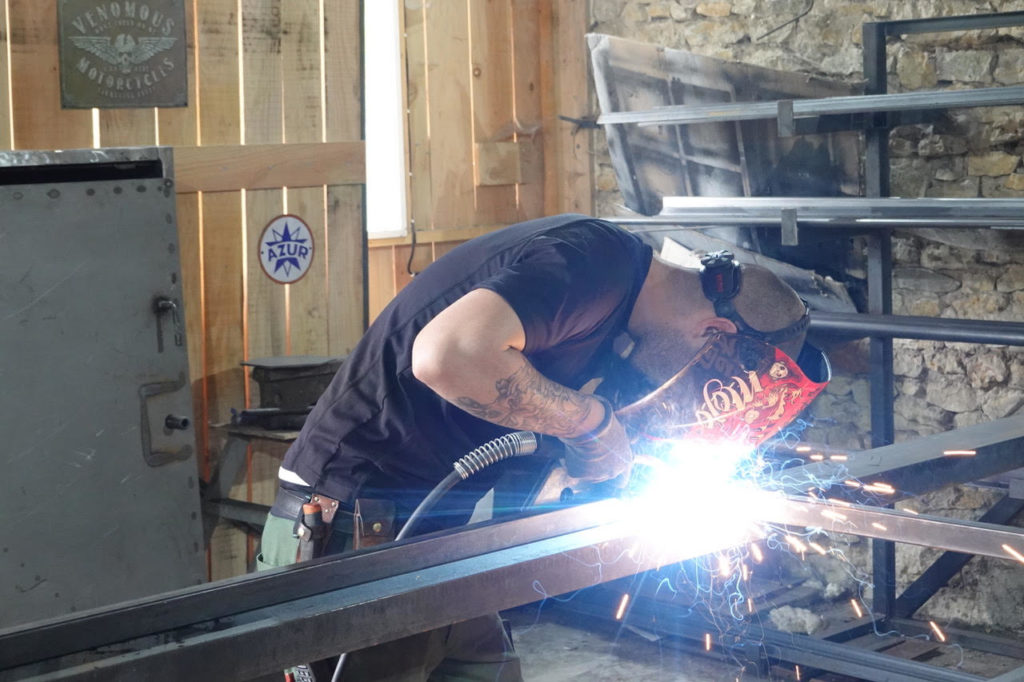This long post comes after a long gap in writing. I will soon post an update for the actual Arclight Project. But for now, I hope you enjoy this story about how I ended up staying with the friendliest fascist in Europe during my adventure on the TET.
The next morning I rose before sunrise and packed my things away in preparation for the long road ahead. I wanted to make another 200 miles to bring me to the edge of the Massif Central – France’s expansive central highlands which leads to the south. All my devices were charged and I had managed to maintain some sense of order by the time my boots were buckled down and helmet fastened.
The sun poured like honey through the matrix of trees overlooking the lake as I re-joined the trial leading south. The vast open spaces that I covered the day before morphed into more technical terrain. At times I found myself battling through thick forest and navigating my way through all sorts of woodland gubbins. Yobbish gatherings of belligerent brambles needed only a brisk twist of the wrist to be whipped aside, whereas the great trunks of old fallen trees demanded more thought and respect to get to the other side and continue on the trail.
This was such fun. Getting stuck and finding your own way out to continue down a muddy path through the woods brings a unique thrill and sense of achievement. I had the excitement of feeling lost, but security from the GPS to reassure me I was heading in the right direction.
It is in this terrain when Josephine, a 21-year-old Honda XR400, is able to defy ordinary rules of aging. Her astonishing versatility emasculates commercialism’s insistent call for attention towards new bikes for trail riding. I had begun my trip in Hereford, England and ended up riding around 500 miles of tarmacked road before meeting the trail. Although not designed for street use, she responded dutifully and I made it with only a sore bum was to remind me that this seat was not made to be sat on for long periods of time. Now well into the off-road riding, she turned into the gnarly gangster that she would have been regarded as back in the day.
Coming out of the woods and toward the massif central, the trail became rocky and undulating. I flew out of one patch of trees onto a dusty path that led me up into a vineyard that was steeply inclined to make one face of an impressive mountain valley. We made good ground, whipping through these winding vineyards and leafy forests with no one in sight or earshot for the loud engine and cloud of dust to bother.
I stopped for a coffee and some bread and fruit at lunch time in a small town but was soon back on the road. At about 2 pm, 30 km from the nearest civilisation, disaster struck – a punctured rear tyre somewhere in the middle of nowhere.
During the planning for this trip I had decided not to bring heavy iron tyre levers and a pump with me. Instead, I brought two cans of “Tyre Weld”, which is a can of pressurised foam that should, in theory, temporarily fix a puncture on the roadside for long enough to get you to the nearest garage. For it to work, you have to connect the canister to the tube, open the tap and then ride immediately for a few miles at around 50 mph so that the foam can circulate. Once you get going it is like treading on eggshells because only a fresh patch of wet foam is holding the pressurised air in the tube.
I made it around 8 km before the temporary plug failed and air rushed out of the rear wheel causing me to lose control and tumble face first into a leafy hedge on the side of the road. I was left suspended by the web of greenery, panting and confused as to how I ended up with twigs poking through my helmet and tickling my nose. Thankfully, I wasn’t going so fast and after regaining my senses the only thought in my mind was that there was just one more can of tyre weld remaining. The chances of success after one failure is slim but this was no time for despair.
I untangled myself, picked up the bike and went through the process of re-inflating the wheel. This time, the stakes were higher. If it failed, I would have no more chances and I would be truly stuck and in need of some kind of rescue. I was now familiar with the hasty process of getting the bike rolling as soon as possible after inflation. Again, my big boots minced on a plane of prematurely hatched eggs. Almost inevitably, 12km from the nearest town, the tyre blew again and I plummeted into the figurative soup of albumin, sticky with failure. It was time to make a new plan.
I pushed my bike for a kilometre in the blazing heat and sat on a mossy stone wall underneath a willow tree next to an intersection of a main road. Josephine was now a largely immobile 140kg (barely) rolling weight, although I didn’t judge her for her immobility – it was probably my fault after all. A prolific blackberry bush lay invitingly over the wall by my side and I sat eating the fruit one after another whilst hatching a plan. Although it pained me, the path of least resistance was to call my breakdown cover and amazingly they said they could be there in about an hour.
Whilst waiting on the mossy wall, a small white van pulled up next to me. A pallored man with a long goatee beard a shaved head stepped out of the driver’s side, lighting a cigarette as he appeared from around the back of his vehicle. Putting the lighter back in his heavy-duty camouflaged trousers, he drew from the cigarette, pulling in his cheeks and sinking his dark eyes further into his head which for a moment resembled a bone-white skull. Exhaling the smoke, releasing the tension in his face and cracking into an enthusiastic smile, “Salut!” he exclaimed, waving like a friendly child and bearing a set of beige pointy teeth. “Bonjour!” I replied, rapidly trying to resolve the conflict between the stereotype and his friendly manner.
In my broken French I explained to him what had happen and with a firmly erected index finger he signalled me not to move (as if I could). He lunged into the back of his van, launching rattling boxes and bits of equipment to the back, before re-surfacing with a 2L bottle of water, a squashed white bread sandwich and a tin of meat bits and veg. He left these on the stone wall and put his hands in his pockets in search of a piece of paper and a pen. Surprising himself with the rediscovery of his lighter at the same time, he re-lit his cigarette before writing his name and address down. He told me that I was more than welcome to stay at his that evening if I needed to. I took it gratefully but explained that any minute I would be on the way to the garage and hopefully far from this place by nightfall.
10 minutes and 3 cigarettes later he got back into his van and drove off, leaving us both smiling and warm with the feeling of new friendship.
Sure enough, the tow truck arrived and took me to the garage. The place was a high end enduro outlet. Expensive modern bikes looked on disapprovingly as Josephine limped into the workshop.
I sat and ate the tinned veg in the sun, admiring with some jealousy the store of new dirt bikes that they had in their warehouse.
They fixed the tyre and I rode to the town to drink a coffee and make a plan. To my horror, when I returned to my bike the tyre was flat again. The mechanics must have made a mistake for it to have deflated again so quickly. I called the garage and explained what had happened and asked if they could fix it again today, to which they replied “we are closing in 10 minutes so probably not” – nice one. Josephine was once again reduced to a dead weight. I stress ate half a baguette in an attempt to quell my feeling of injustice served by the snobby mechanics in their castle of shining KTMs and Husqvarna’s. Nb. The tonic for stress, if there is one, is certainly not large quantities of white bread. I was left feeling tired, bloated and hard-done by.
I then remembered about Kevin and shaking my head disbelief at this situation I found myself dialling the number of the warm-hearted metal-head. As I did so, my apprehension faded and I felt sure about the genuiness of our interaction and that this was the right thing to be doing. In half an hour we were sat side by side again next to his white van, smoking cigarettes and laughing about the situation that we found ourselves in.
We loaded up the bike in the back of his van and set off for his house which was in a village of 100 people sparsely dotted about, out of sight from any larger settlement. He introduced me to his beautiful family – His wife who looked after children with head injuries and 7-year-old daughter who lived a free life that largely consisted of caring for their various animals, doing puzzles and keeping her dad company in his workshop. Their home was a sanctuary for various happy creatures. A large cow that they had saved from slaughter some years ago, four goats, three dogs and countless chickens, Guinea pigs and cats, all of which lived harmoniously and gratefully on their patch of land. Their homestead epitomised self- sustainability in all meaning of the term. Kevin had built the place from the ground up and poured his love and skill into its design.
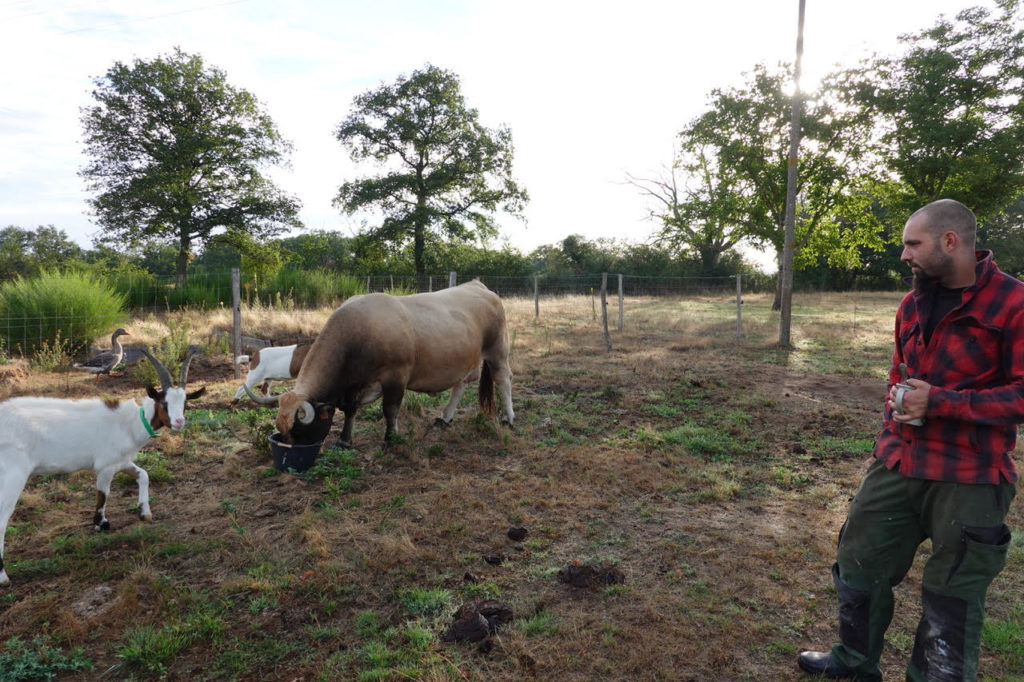
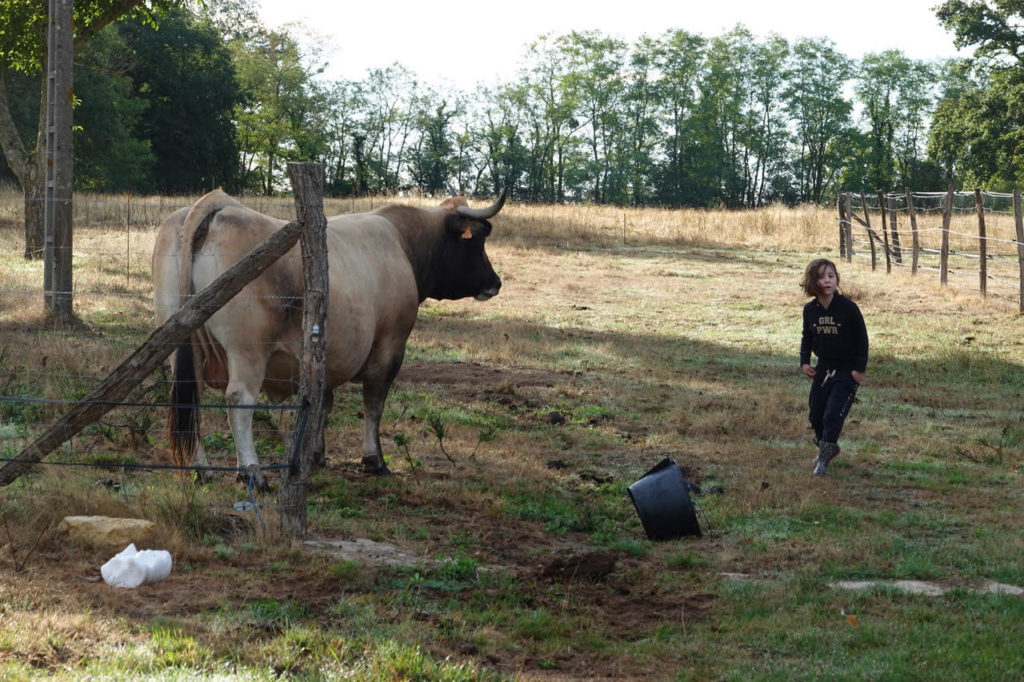
Kevin proudly took me around his home and gave me a tour of his workshop where he skilfully manipulates metal into any shape that he wants. He then showed me his office, above the workshop. Diverging from the image I had of him, as a loving person who cares for nature and likes to help people, he revealed a jaw-dropping collection of machine guns, sniper rifles, pistols, grenades and combat knives.
It was an odd feeling being around these weapons of destruction. In fact, I almost cried when I held the fully functional AK47 that he plucked from the cabinet of assault rifles and put in my hands. Its cold, heavy weight felt like death in my hands and cast an overwhelming feeling of sadness through me. Guns are capable of enabling the most destructive aspects of human behaviour. They are machines built to inflict pain or kill, and, in my opinion, their very existence is something to abhor. The question of why someone so loving would collect guns in this way was unavoidable.
We spoke for a long while about it and he explained his rationale. He was an anxious man who had poured effort and love into the creation of his sanctuary. He loved his child and his wife and did indeed care for nature, saying that he had never and would never kill an animal unless absolutely necessary. But his political and moral position could be described, as he put it, “far far far right”. I was once again met with an internal conflict as images of recent far right protests in London flooded my mind. I pressed on with the questioning to understand Kevin, who was showing me warmth and kindness as well as his collection of machine guns.
I soon realised that he could not be considered in the same light as the far right protesters that we saw in London during the summer of 2020 – the topless waddling thumbs who crashed their sweaty bellies against police shields in a frenzy of spilt beer and blood, inciting hate and wasting public services with each heinous rally. Instead, I learnt how Kevin’s journey had led him to his radical position. He had grown up an angry and troubled youth living on the streets of Paris, estranged from his parents from an early age. He found purpose initially through the discovery of his innate craftsmanship and then the relationship with his wife, changing his temperament and attitude to society. “You have to work” He told me. I could see that every material thing around him he had designed and built himself. He learnt the skills to do so through years of practice, continual work and deep thought.
His attitude was simple. Be kind, be generous and work hard. These are not principles that you would associate with far-right philosophy, but in Kevin’s case they were the pillars on which he had built his life. But the question still remained, why would you keep all those guns? “For protection, of my life and my family” he said honestly.
Kevin saw the accelerating multi-culturalism of recent decades as a threat and in response typical to his upbringing he responded by preparing for war. “I don’t want to fight, but I am ready if I have to” – he explained, and I believed him. He had moved away from Paris, and his small family farm was far from the thing he feared most. But that was it – fear – he was afraid of losing all that he loved and had worked so hard for. He simply could not understand changes occurring in his home-country which subsequently bred anxiety and hostility towards different cultures. But it is important to note that he was not, on a local level at least, racist. There were people from different ethnic backgrounds in his village who he liked and respected. He would probably extend the same generosity to them as he was to me. This is because he knew them as individuals which meant he was not threatened by their differences. His deep-set anxiety was not towards People of Colour or Muslims but borne from fear of unfamiliarity which was pressed upon by the introduction of different cultures into France. In my opinion, this attitude is a remnant of his troubled upbringing during which he literally had to fight to survive.
So, on a local level he did not discriminate against humans around him. Respect was earnt individually through developing relationships, regardless of ethnicity. Perhaps then, with more care taken in the introduction of new cultures to French society, or without relentless inflammatory media reports, he may not perceive societal differences as a threat to his family?
If it needs saying, on a wider scale his attitude is problematic. This is for several reasons. Firstly, there will be many French people that welcome multiculturism, so his nationalistic attitude may not actually be representative for much of the country. Second, although in his village of 100 people he was able to get to know each person and apply his criteria for respect and peace, this is not possible for everyone of a non-white ethnicity in France. For that reason, he cannot make judgments about “Muslims in France” or “Africans in France”. Finally, aspects of multiculturalism were bred from French colonialism during their pioneering past, so to be scornful towards the product of the very thing you uphold shows short-sightedness.
I did not grow up under continual threat and had the blessing of education throughout my youth. I do not judge Kevin for his stance. I respect him for how he has realised his potential and listened to his heart in the moments it chose to speak to him. I just hope that at no point in the future the ghosts of his past guide his skilled hands to destruction, aided by the weapons he keeps.
That evening we had a dinner made entirely with vegetables from the farm and drank some beers. His wife doesn’t let him smoke on the farm or talk about guns, rules which he adheres to diligently. His priorities were obvious and his heart, although still bearing the scars of childhood trauma, was warm to living things around him.
In the morning he gave me lift into the garage and helped justify my case to the mechanics not to pay again to fix the failed puncture repair. Him and his daughter put a sticker with his business’s logo on the back of Josephine and we waved goodbye knowing that one day we will cross paths again.
